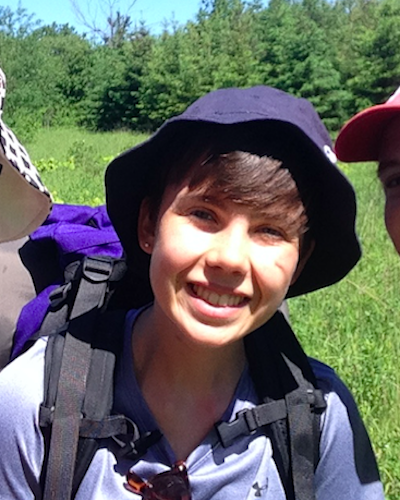HBA Sustainability Certificate
Empowering the next generation of sustainable leaders
I’m a fourth-year student pursuing my HBA and Honors Specialization in Psychology. One of my dreams is to become an author/illustrator of children’s stories, but I also want to work in education by developing student services locally and improving access to education globally. I think teaching is done best through stories, and songs are sung best around campfires. I love hiking, biking, and going on adventures. I believe the things that count the most in life are the things you can’t count, and I try to live every day accordingly.
What is your personal definition of sustainability?
I believe sustainability is more direction than destination; it’s a function of the way we choose to live our lives every day. Wendell Berry (American poet, environmental activist, and cultural critic) spoke well when he said, “What I stand for is what I stand on.” Sustainability is when what we stand for will be able to hold us up indefinitely.
I also think that sustainability isn’t just about the environment; families, governments, and economies can be sustainable. Ultimately, sustainability is about relationships, and in each of these relationships we need to serve, rather than use one another.
What role do you see sustainability playing in your professional career?
Ideally, I would like my professional career to directly contribute to sustainable development. At the very least, I value strong CSR policies and people who are intentional about the impact they have on their community, environment, and corporate culture.
Something that changed my perspective was when I read that over 130 million of the world’s children have never been in school, and it would cost $12 billion a year to provide them with access to education. Most people assume that’s not something we can do overnight, but Americans alone spend $14 billion on ocean cruises, $18 billion on makeup, and $40 billion on golf each year (Kielburger, 2011). That shocked me. I realized something has to change, and I need to be a part of it.
I’ve come to see business as a powerful vehicle for raising awareness and distributing resources. I’ve also become particularly passionate about education. I would love to develop student services locally (ex. Western’s Leadership Education, Scholar’s Electives, and Community Engaged Learning Program). I could also see myself working in strategy or marketing for global organizations such as World Vision, WE, and Compassion.
Kielburger, Craig. Free the Children. Toronto, ON: Me to We, 2011.
What sustainability projects have you been engaged in?
One of my largest commitments is with the LEADER Project at Ivey. LEADER is a student-driven, overseas economic development program that provides future and current entrepreneurs with analytical tools, thought processes, and decision-making skills. We offer two-week intensive courses at partner sites in Eastern Europe, Nepal, India, and Vietnam, as well as an indigenous site being piloted in Yukon, Canada (this year I’ll be travelling to teach in Nepal). As a member of LEADER, I’ve been specifically involved in developing leadership, ethics, and CSR curricula. This material has never been a part of LEADER before, and I’m grateful for the opportunity to launch it on global scale.
Another one of my sustainability-oriented passion projects has come from working alongside Western’s Student Success Center and the Leadership Education Program (LEP). Last year I collaborated with LEP staff and members of the Foundation for Environmental Sustainability (FES) to develop a new workshop called “Engaging in Sustainable Development.” This workshop features material from the United Nation’s SDG Youth Training - Canada program, and empowers students to consider how they can work towards eradicating extreme poverty, ensuring environmental sustainability, and reducing inequalities within and among countries by 2030.
Helen Schreyer
